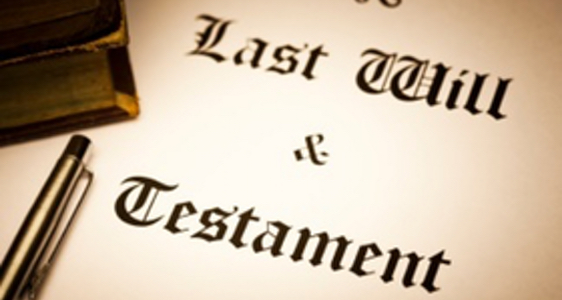Wills, Trusts & Estates

WILLS
Death is inevitable. Although not always a pleasant topic to think about, we will all face it at some point in time. Will you be prepared when it's your time to go? The answer to that question may depend, in part, on whether or not you have a valid, up-to-date will.
A Will is a document a person creates to make certain decisions which take effect after death. Among other things, a will may be used to leave instructions regarding:
1. the disposition of your property;
2. the payment of your debts;
3. the selection of an executor for your estate; and
4. the appointment of a guardian for your child(ren).
A will can be as simple or complex, as specific or as general, as is desired, and can be tailored to your specific wishes. Although made in contemplation of death, a will allows for peace of mind. Most people feel a sense of relief after signing a will.
WHY YOU NEED A WILL
The following is a partial list of what may occur if you do not make a will:
- Your property is distributed according to state law. This may be very different from your actual wishes. In fact, if you die without a will and are not survived by certain relatives, your property will go to the State.
- If you do not have a surviving spouse, a Court will decide who will be the guardian of your child(ren). The Court may not make the same decision you would have made.
- You lose the opportunity to select the executor of your estate. The executor is the person who locates heirs, pays debts of the estate, finds and lists property, and distributes the property in your estate. An executor should be someone who is familiar with financial matters and record keeping. A relative, friend, or professional executor may often serve as executor.
- Conflict may be more likely to arise between family members. Each person in your family may have a different idea about certain decisions you would have made, such as who is to be the executor of your estate or the guardian of your child(ren), and may argue with each other or contest such issues in court.
GENERAL TIPS
- Consult an attorney to draft a valid will. In order for a will to be valid, certain detailed requirements and formalities are necessary.
- Keep your will current. It is a good idea to review your will every year and update it as necessary. Wills are revocable and may be changed.
- Keep your will in a safe place. It should be kept so that it can be easily located when you die. Furthermore, you should tell your executor and/or at least one close family member where your will is located.
ESTATE ADMINISTRATION / PROBATE
Estate Administration, or what is commonly referred to as Probate, is the legal process of administering and properly disposing of the property and affairs of someone who has died. This process includes the collection of assets, the payment of debts and taxes, and the distribution of property to heirs. These activities are carried out by the executor of the estate, otherwise known as the personal representative.
At Effner Law Firm, we help you deal with the legal issues that arise from the loss of a loved one. We understand the death of a loved one can be overwhelming, and it is often a very stressful and emotional time. With that in mind, we can help to alleviate some of the stress and help to guide you through the entire process.
TRUSTS
A trust is a legal entity established for the benefit of designated beneficiaries. It may be created to become operative either during the life of the person creating it (the settlor) or at his/her death, pursuant to a will. It is an instrument you may use to better direct the distribution of your assets. Trusts can be used for many purposes, such as conditioning a beneficiary's ability to receive money upon the happening of a certain event or upon the attainment of a certain age. With a trust, a trustee is selected by you to carry out the terms of the trust, and he/she would hold a fiduciary responsibility to manage the trust's assets and income for the economic benefit of the beneficiaries. Professional trustee services, such as those offered by a bank, may also be used if so desired.
LIVING WILLS
A Living Will is a document through which you may give advance instructions about your health care preferences, such as the withholding of life-sustaining medical treatment, to be followed in the event that you are no longer able to make decisions regarding your own medical treatment, and:
- You have an incurable injury, disease, or illness;
- Your death will occur within a short time; and
- The use of life prolonging procedures would serve only to artificially prolong the dying process.
If you understand your medical condition and the effect of the proposed medical treatment, you will still be able to make your own decisions. If you are unconscious or otherwise unable to make your own medical decisions, your intentions expressed in your Living Will generally control.
POWERS OF ATTORNEY
A Power Of Attorney is a legal document that grants another person, called an attorney-in-fact, authority to act on your behalf. The authority granted is defined by the specific language of the document. It may be needed for a specific matter only, or it may be used to give another person the authority to handle any matters that may occur. A Power Of Attorney can be a helpful tool to allow your attorney-in-fact to manage your financial matters in the event you need help or become incapacitated.
